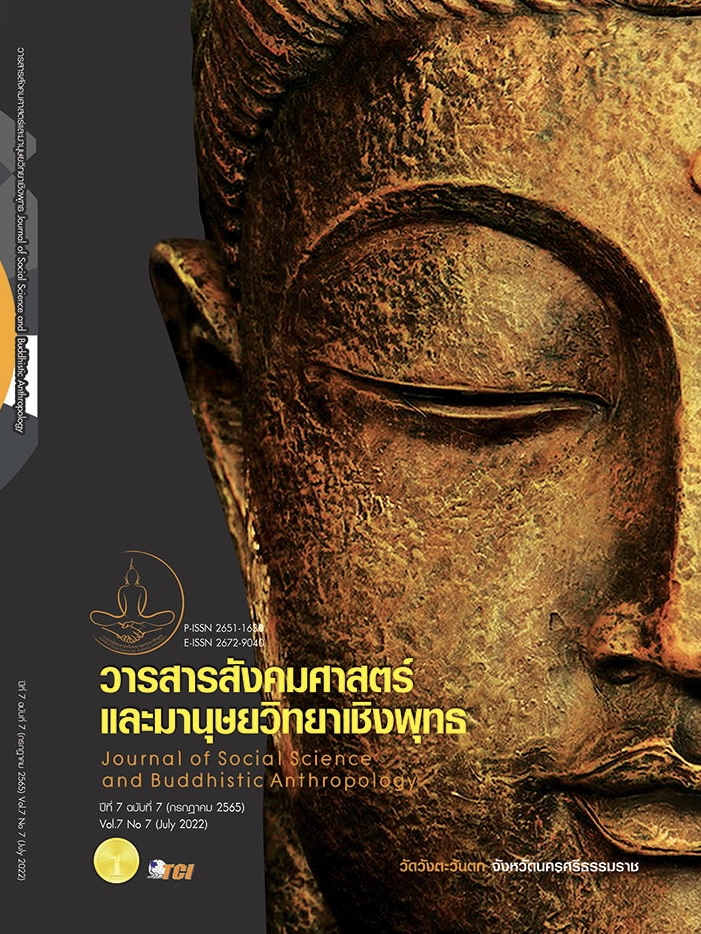VALUE PROPOSITION FOR SUSTAINABLE OF FAST CASUAL RESTAURANT
Keywords:
Value Proposition, Sustainability, Fast Food Restaurant Business, HealthyAbstract
The Objectives of this research article were to study factors and values proposition in terms of consumer behavior, perceived value, satisfaction and sustainable success of healthy fast casaul restuarant. This research applies a mixed research method using both quantitative research and qualitative research. In quantitative research, a sample of 444 consumers was selected. Cochran's sample size theory was applied because the population is large and the exact number of the population is unknown. Samples were selected by Cluster Sampling method with a questionnaire as a tool. It was found that consumer behavior has a direct impact on the success of healthy fast casual retuarant. Factors affecting the success of healthy fast food restaurant operators include value proposition, perceived value and satisfaction. Value proposition affects the perceived value, satisfaction and sustainable success of a healthy fast food restaurant business. In term of value proposition factors, consumers place the highest priority on quality of products and services, followed by customer relationship management. In terms of perceived value factors, consumers place the highest priority on social values followed by functional value. As for the consumer satisfaction factor It was found that the highest priority was value for money compared to the cost paid, followed by convenience and accessibility. In terms of sustainable growth factors, consumers place the highest priority on social well-being followed by environmental protection.
References
ต่อลาภ สมัครัตน์. (2563). จับธุรกิจร้านอาหารมาให้เจ้ง. เรียกใช้เมื่อ 17 มิถุนายน 2564 จาก https://www.smartsme.co.th/content/21652
ลงทุนแมน. (2562). จำนวนแรงงานของแต่ละอุตสาหกรรม. เรียกใช้เมื่อ 21 มิถุนายน 2564 จาก https://www.longtunman.com/19529
วงใน. (2563). การเติบโตธุรกิจร้านอาหาร. เรียกใช้เมื่อ 22 มิภุนายน 2564 จาก https://techsauce.co/pr-news/wongnai-for-business
ศุภริน เจริญพานิช. (2564). บทวิเคราะห์ธุรกิจ SMEs สาขาธุรกิจร้านอาหาร. เรียกใช้เมื่อ 4 ธันวาคม 2564 จาก https://www.sme.go.th/upload/mod_download /download-20210909160132.pdf
ศูนย์วิจัยกสิกร. (2563). มูลค่าธุรกิจร้านอาหารในประเทศไทย. ศูนย์วิจัยกสิกร. เรียกใช้เมื่อ 21 มิถุนายน 2564 จาก http://thaiejournal.com/journal/2556volumes4/41.pdf
สุเนตรา เล็กอุทัย. (2553). ความสำคัญของอุตสาหกรรมอาหารต่อระบบเศรษฐกิจไทย. ใน โครงการกิจกรรมการเชื่อมโยงงานวิจัยกับภาคนโยบาย สำนักงานกองทุนสนับสนุนการวิจัย. (สกว.).
Bollen, K. A., et. al. (1992). Bootstrapping Goodness-of-Fit Measures in Structural Equation Models. Carolina: University of North Carolina at Chapel Hill.
Cochran, W. G. et. al. (1965). The planning of observational studies of human populations. Journal of the Royal Statistical Society. Series A (General), pp234-266 .
Creswell, J. W. (1994). Research Design: Qualitative and quantitative Approaches. London: SAGE Publications.
Ittner, C. D. & Larcker, D. F. (1996). Measuring the impact of quality initiatives on firm financial performance. In Fedor, D.F., Ghosh, S. (Eds.), Advances in Management of Organization Quality. (p. 1-37). Greenwich. JAI Press.
Kotler, P. (2016). Marketing Management: Analysis, Planning, Implementation and Control (15th Global ed.)Upper Saddle River. NJ: Prentice-Hall.
Lindeman, R. H. et. al. (1980). Introduction to Bivariate and Multivariate Analysis. Glenview, IL: Scott, Foresman and Company.
Osterwalder, A. & Yves, P. (2010). Business model generation: a handbook for visionaries, game changers, and challengers (p.51-67). NJ: John Wiley & Sons.
The World Commission on Environment and Development (WCED). (1987). Brundtland Report. Retrieved December 5, 2021, from https://sustainable
development.un.org/content/documents/5987our-common-future.pdf
Downloads
Published
How to Cite
Issue
Section
License
Copyright (c) 2022 Journal of Social Science and Buddhistic Anthropology

This work is licensed under a Creative Commons Attribution-NonCommercial-NoDerivatives 4.0 International License.









